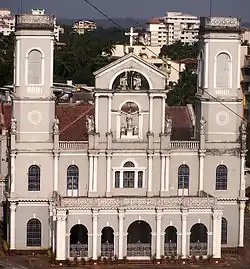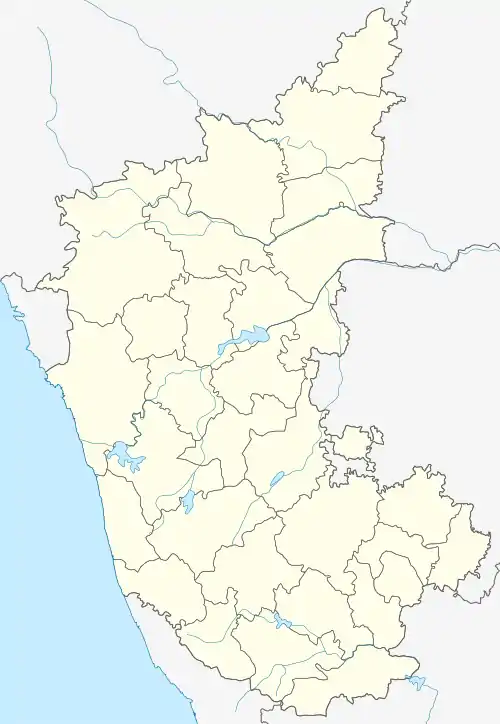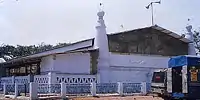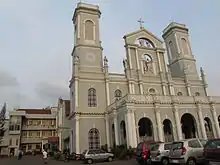Milagres Church (Mangalore)
The Milagres Church (Portuguese: Igreja de Nossa Senhora dos Milagres, English: Church of Our Lady of Miracles) is a historic Roman Catholic Church situated in the Hampankatta locality of Mangalore. The church was built in 1680 by Bishop Thomas de Castro, a Theatine from Divar, Goa. The original structure was constructed at the site of the present-day cemetery.[1] It is one of the oldest churches in Dakshina Kannada.[2]
| Milagres Church | |
|---|---|
 | |
 Location in India | |
| Former names | Igreja de Nossa Senhora dos Milagres |
| Alternative names | Church of Our Lady of Miracles |
| General information | |
| Town or city | Hampankatta, Mangalore, Dakshina Kannada district, |
| Country | India |
| Coordinates | 12°52′03″N 74°50′40″E |
| Completed | 1680 |
| Design and construction | |
| Architect | Bishop Thomas de Castro |
First Milagres Church (1680−1784)

Due to its substantial Roman Catholic population, Mangalore occupied a prominent place in the church administration in India during the 17th century.[2] The Goan Catholics who migrated to Canara lacked priestly leadership, as many of the migrant priests had returned to Goa when the Portuguese withdrew from the region.[2] In 1658, a Carmelite missionary, Fr. Vincento Maria de Santa Catharina visited Canara and reported to Rome about the miserable state of Christianity in that region.[2] The Holy See came to the aid of the Canara Christians, and appointed a Theatine, Bishop Thomas de Castro as the Vicar Apostolic of Canara and Malabar in 1674.[2] Bishop de Castro arrived in Mangalore in 1677, and received a piece of land from the Keladi Queen Chennamma as gift.[2] After the church was constructed there in 1680, he took up residency in its quarters.[2] Bishop de Castro died on 16 July 1684, and his remains were buried in the south eastern corner of the cemetery, where his grave may be identified by its bronze slab next to the St. Monica Chapel.[2]
After Queen Chennamma's death, the land was repossessed by her successor, King Basavappa. In 1715, a local priest Fr. Pinto secured the land again from Somashekara II. His nephew Fr. Alfred Pinto who succeeded him, built a new church at the site of the present church in 1756. In 1763, Canara fell under the suzerainty of Hyder Ali and then his son Tipu Sultan in 1782. Believing that the local Christians had conspired against him with the British during the Second Anglo-Mysore War; Tipu captured about 60,000 Mangalorean Catholics on Ash Wednesday 24 February 1784, and herded them to his capital at Seringapatam.[4] In the same year, he also destroyed 27 churches including the Milagres Church.[5]
Present structure

After Tipu was killed by the British during the Fourth Anglo-Mysore War on 4 May 1799, the Mangalorean Catholics were freed from Captivity and most subsequently returned to Mangalore. Among the returnees was a baker Lawrence Bello, who built a chapel to replace the demolished church, on the site of the present church at a cost of Rs. 400. Fr. Mendez, the Vicar Apostolic secured the necessary furniture, and together with Tipu's former munshi Salvador Pinto, raised funds and obtained a grant of Rs. 600 to build the church from the government. He laid the foundation stone for a new spacious church in 1811.[6] In 1911, the facade of the church collapsed, following which then incumbent Parish priest Fr. Frank Pereira erected the present church structure with Fr. Diamanti S.J. as architect. A portico was added later to the structure.
See also
Citations
- Prabhu 1999, p. 159
- Pinto 1999, p. 156
- Monteiro 2005
- Prabhu 1999, p. 231
- D'Souza 1983, N. 11, p. 40
- Farias 1999, p. 215
References
- D'Souza, A. L. P. (1983), History of the Catholic Community of South Kanara, Desco Publishers.
- Farias, Kranti K. (1999), The Christian Impact on South Kanara, Church History Association of India.
- Monteiro, John B. (8 December 2005), Tippu Sultan’s Footprints in Tulunad, Daijiworld Media Pvt Ltd Mangalore, archived from the original on 21 March 2012, retrieved 7 November 2011
- Pinto, Pius Fidelis (1999). History of Christians in Coastal Karnataka, 1500–1763 A.D. Mangalore: Samanvaya Prakashan.CS1 maint: ref=harv (link).
- Prabhu, Alan Machado (1999). Sarasvati's Children: A History of the Mangalorean Christians. Bangalore: I.J.A. Publications. ISBN 978-81-86778-25-8.CS1 maint: ref=harv (link).